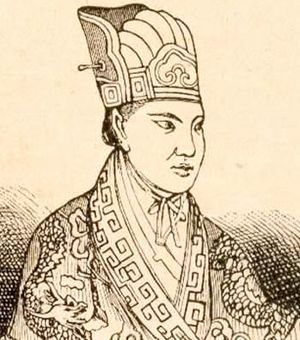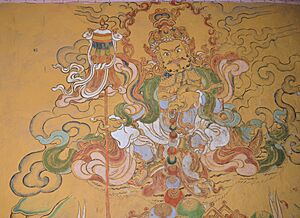Heavenly King facts for kids
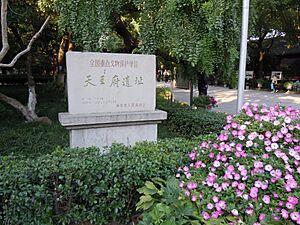
The Heavenly King or Tian Wang (Chinese: 天王; pinyin: Tiān Wáng; Wade–Giles: Tien1-wang2) is a special title from China. It means "Heavenly King" or "Heavenly Prince." This title was used for different religious gods and important leaders throughout history. It was also sometimes another way to say "Son of Heaven," which was a title for the emperor.
The Chinese words for Heavenly King are 天 (tiān), meaning "heaven" or "sky," and 王 (wáng), which can mean "king" or "prince." The most famous use of this title was for the kings of the Taiping Heavenly Kingdom. It is also used in religious groups, especially in Buddhism.
Contents
Historical Uses of Heavenly King
Early Chinese Kingdoms
During the Spring and Autumn period (a long time ago in China), the term Heavenly King was sometimes used for the kings of different Chinese states. For example, in an old text called the Spring and Autumn Annals, it talks about how the King of Zhou helped pay for a funeral. This shows that "Heavenly King" was like calling the king the "Son of Heaven."
|
秋,七月,天王使宰咺來歸惠公仲子之賵。 |
In autumn, during the 7th month, the Heavenly King was brought to tears and bestowed a contribution to the funerary expenses of Duke Zhong's son. |
| —Line 7, Book 1 of the Spring and Autumn Annals |
The Sixteen Kingdoms Period
Later, during the Sixteen Kingdoms period, many leaders of Chinese states called themselves Heavenly King. This was a common title for rulers then. Some examples include:
- The leader of Later Zhao, Shi Le, called himself Heavenly King in 330.
- Fu Jian, an emperor of Former Qin, also used this title. His wife was called "Heavenly Mistress."
- The founder of Helian Xia, Helian Bobo, became Heavenly King when he started his state in 407.
Southern Song Dynasty
During the Southern Song Dynasty, a rebel leader named Yang Yao (simplified Chinese: 杨幺; traditional Chinese: 楊幺; pinyin: Yáng Yāo) used the title Heavenly King. He led a rebellion against the Song government in Hunan. Yang started as a soldier in a revolt in 1130. He and about 80,000 other soldiers took over the Dongting Lake area.
After some battles, Yang became the main leader of the rebels. He called himself the "Great Sage Heavenly King" (simplified Chinese: 大圣天王; traditional Chinese: 大聖天王; pinyin: dàshèng tiānwáng). However, his time as Heavenly King was short, lasting only three years. In 1135, the Song forces defeated the rebels, and Yang Yao was killed.
Taiping Heavenly Kingdom
The most famous and recent use of the Heavenly King title was by Hong Xiuquan during the Taiping Heavenly Kingdom. Hong's reasons for using this title were different from earlier leaders. His kingdom was based on strong beliefs and a new religion. Hong believed that God had directly told him to become king. Because of this, he felt he was a "heavenly" king, chosen by heaven to rule a "heavenly" kingdom.
After Hong Xiuquan died, his son, Hong Tianguifu, became the next Heavenly King. However, Hong Tianguifu was very young and was executed soon after becoming king. This ended the use of the Heavenly King title for the Taiping Heavenly Kingdom.
Religious Uses of Heavenly King
Even today, the term Heavenly King is used in Chinese Buddhism. Here, it has a more religious meaning. A good example is the Four Heavenly Kings. These are four Buddhist gods, and each one protects one of the four main directions (north, east, south, west). They are:
- Vaiśravaṇa (Chinese: 多闻天王; pinyin: Duōwén Tiānwáng)
- Virūḍhaka (Chinese: 增長天王; pinyin: Zēngcháng Tiānwáng)
- Dhṛtarāṣṭra (Chinese: 持国天王; pinyin: Chíguó Tiānwáng)
- Virūpākṣa (Chinese: 广目天王; pinyin: Guǎngmù Tiānwáng)
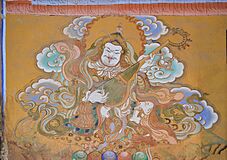 |
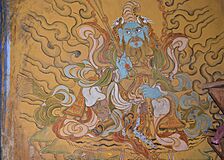 |
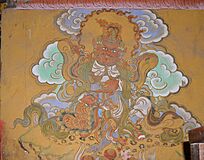 |
|
| Guardian of the North, Vaiśravaṇa | Guardian of the East, Dhṛtarāṣṭra | Guardian of the South, Virūḍhaka | Guardian of the West, Virūpākṣa |
Heavenly Kings in Other Countries
Sometimes, the title Heavenly King has been used outside of China too. This happened in Korea and Vietnam, which have been influenced by Chinese culture for a long time.
- In Korea, the term is used for Hwanung, a legendary founder of Gojoseon.
- In Vietnam, it refers to a mythical folk hero named Thánh Gióng.
See Also
- High king
- Chinese sovereign
- Chinese nobility
- Emperor of China
- Puxian Wannu
- Hong Xiuquan


